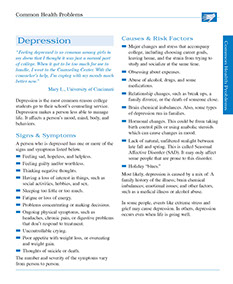CONDITIONS
SYMPTOM CHECKER
Male
Female
Child
Arm, Hand & Shoulder Concerns
Legs & Feet Concerns
Dental & Mouth Concerns
Ear & Nose
Eye Conditions
Head Conditions
Arm, Hand & Shoulder Concerns
Legs & Feet Concerns
Front
Back
Arm, Hand & Shoulder Concerns
Dental & Mouth Concerns
Ear & Nose
Eye Conditions
Head Conditions
Arm, Hand & Shoulder Concerns
Dental & Mouth Concerns
Ear & Nose
Eye Conditions
Head Conditions
Front
Back
Arm, Hand & Shoulder Concerns
Neck Links
Head & Neck Concerns
Arm, Hand & Shoulder Concerns
Neck Links
Head & Neck Concerns
Front
Back
Online Clinic
Wise Healthcare
Depression
Print on Demand
RELATED ARTICLES
Depression is the most common reason college students go to their school’s counseling service. Depression makes a person less able to manage life. It affects a person’s mood, mind, body, and behaviors.
General Safety Guidelines
Signs & Symptoms
The number and severity of the symptoms vary from person to person. A person who is depressed has one or more of the signs and symptoms listed below.
• Feeling sad, hopeless, and helpless.
• Feeling guilty and/or worthless.
• Thinking negative thoughts.
• Having a loss of interest in things, such as social activities, hobbies, and sex.
• Sleeping too little or too much.
• Fatigue or loss of energy.
• Problems concentrating or making decisions.
• Ongoing physical symptoms, such as headaches, chronic pain, or digestive problems that don’t respond to treatment.
• Uncontrollable crying.
• Poor appetite with weight loss, or overeating and weight gain.
• Thoughts of suicide or death.
Resources
Causes & Risk Factors
• Major changes and stress that accompany college, including choosing career goals, leaving home, and the strain from trying to study and socialize at the same time.
• Obsessing about expenses.
• Abuse of alcohol, drugs, and some medications.
• Relationship changes, such as break ups, a family divorce, or the death of someone close.
• Brain chemical imbalances. Also, some types of depression run in families.
• Hormonal changes. This could be from taking birth control pills or using anabolic steroids which can cause changes in mood.
• Lack of natural, unfiltered sunlight between late fall and spring. This is called Seasonal Affective Disorder (SAD). It may only affect some people that are prone to this disorder.
• Holiday “blues.”
Most likely, depression is caused by a mix of: A family history of the illness; brain chemical imbalances; emotional issues; and other factors, such as a medical illness or alcohol abuse.
In some people, events like extreme stress and grief may cause depression. In others, depression occurs even when life is going well.
Your school’s Student Counseling Service or Student Mental Health Service. (Normally, these services are no cost to you.)
International Foundation for Research and Education on Depression (IFRED)
Mental Health America (MHA)
800.969.6642
National Mental Health Consumers’ Self-Help Clearinghouse
800.553.4539
Treatment
Treatment includes medicines, psychotherapy, and other therapies that are specific to the cause of the depression. Exposure to bright lights (similar to sunlight) for depression that results from SAD can be helpful. {Note: Some antidepressant medicines can increase the risk for suicidal thoughts and behaviors, especially in children and adolescents. This risk may be higher within the first days to a month after starting the medicine. Persons who take antidepressants should be closely monitored.}
Questions to Ask
Question 1
Have you just attempted suicide or are you making plans for suicide? Do you have repeated thoughts of suicide or death?
Get medical care without delay. If symptoms are life threatening go to the ER or call 9-1-1. Don’t call 9-1-1 or use the ER if symptoms do not threaten life. Ask your doctor ahead of time where you should go for a problem that needs prompt care, but not emergency care.
Question 2
Have you had a lot less interest or pleasure in almost all activities most of the day, nearly every day for at least 2 weeks?
You should be seen by your doctor for medical advice. Contact your doctor or health care provider to find out how soon you should be seen.
Question 3
Have you been in a depressed mood most of the day, nearly every day, and had any of these problems for at least 2 weeks?
• Feeling hopeless, worthless, or guilty, slowed down, or restless. Changes in appetite or weight.
• Thoughts of death or suicide. Problems concentrating, thinking, remembering, or making decisions. Feeling tired all of the time. Trouble sleeping or sleeping too much.
• Stomach or sexual problems. Feeling anxious or worried.
You should be seen by your doctor for medical advice. Contact your doctor or health care provider to find out how soon you should be seen.
Question 4
Has depression kept you from doing daily tasks for more than 2 weeks and caused you to withdraw from normal activities?
You should be seen by your doctor for medical advice. Contact your doctor or health care provider to find out how soon you should be seen.
Question 5
Has the depression occurred with any of the following?
• Recent delivery of a baby. The days between ovulation and menstruation (every month).
• A medical problem. Taking medicines. (This includes antidepressants.)
• Dark, cloudy weather or winter months.
• Abusing alcohol or drugs.
Call your doctor or health care provider and state the problem. He or she can decide what you should do.
Use Self-Care / Prevention:
You can probably take care of the problem yourself if you answered NO to all the questions. Use the “Self-Care” measures that are listed. Call your doctor if you don’t feel better soon, though. You may have some other problem.
Self-Care / Prevention
• Take medications as prescribed. Get your doctor’s advice before you take over-the-counter herbs, such as St. John’s Wort, especially if you take other medications.
• Don’t use illegal drugs. Limit alcohol. These can cause or worsen depression. Drugs and alcohol can also make medicines for depression less effective. Harmful side effects can occur when drugs and/or alcohol are mixed with medicine.
• Eat healthy foods. Eat at regular times.
• Get regular exercise.
• Talk to someone who will listen to the tensions and frustrations you are feeling.
• Try not to isolate yourself. Be with people you trust and feel safe with, even though you feel down.
• Do things you enjoy. Do something that lets you express yourself. Draw. Paint. Write your thoughts in a diary or journal.
• Relax. Listen to soft music, take a warm bath or shower. Do relaxation exercises.
• Avoid stressful situations or taking on added commitments when you feel depressed.
• Keep an emergency number handy (e.g., crisis hotline, trusted friend’s number, etc.) in case you feel desperate.
Feeling better takes time. Don’t expect to just “snap out” of your depression.
To Help A Friend Who Is Depressed
• Help your friend get an appropriate diagnosis. Make an initial appointment with a professional and offer to take your friend.
• Do not ignore remarks about suicide. Report them, immediately, to a student advisor, teacher, or health care provider.
• Be aware of the type of medication your friend needs to take and when it should be taken. If necessary, alert your friend’s health care provider about any side effects that you notice.
• Be supportive. Depression is no different from any other physical illness. It requires patience, understanding, love, and encouragement. Encourage your friend to continue with treatment and to see his or her health care provider if there is no improvement.
• Listen with care. Point out your friend’s successes and attributes when he or she feels worthless, helpless, or down about the future. Helping your friend see previous successes can help give the confidence needed to continue with treatment. Your friend doesn’t need you to tell him or her what to do. Listening is very helpful.
• Encourage your friend to go out and do things with you or with others, such as to see a movie or to do things your friend enjoyed in the past. Don’t push, though, or make too many demands.
• Seek support from organizations that deal with depression.
This website is not meant to substitute for expert medical advice or treatment. Follow your doctor’s or health care provider’s advice if it differs from what is given in this guide.
The American Institute for Preventive Medicine (AIPM) is not responsible for the availability or content of external sites, nor does AIPM endorse them. Also, it is the responsibility of the user to examine the copyright and licensing restrictions of external pages and to secure all necessary permission.
The content on this website is proprietary. You may not modify, copy, reproduce, republish, upload, post, transmit, or distribute, in any manner, the material on the website without the written permission of AIPM.
2021 © American Institute for Preventive Medicine - All Rights Reserved. Disclaimer | www.HealthyLife.com
















































